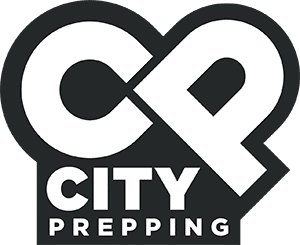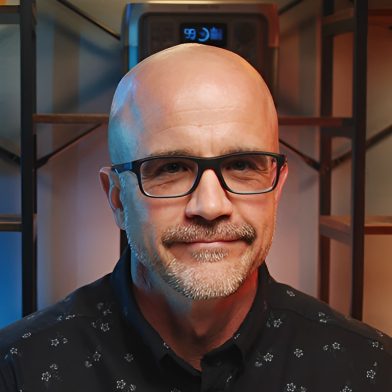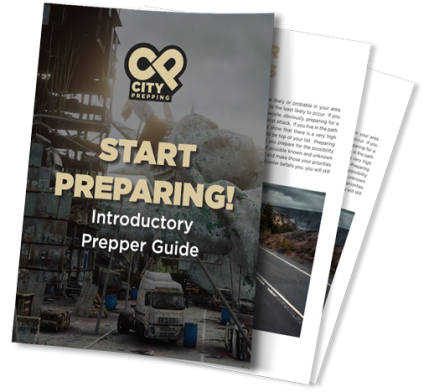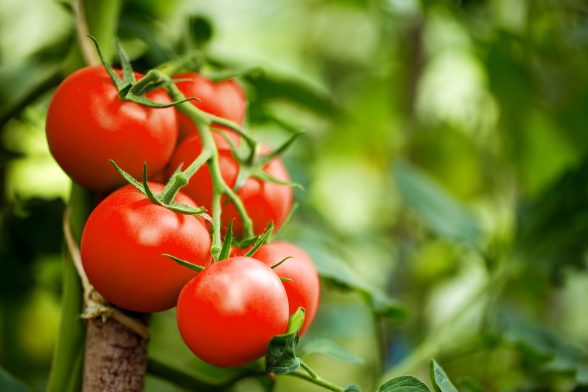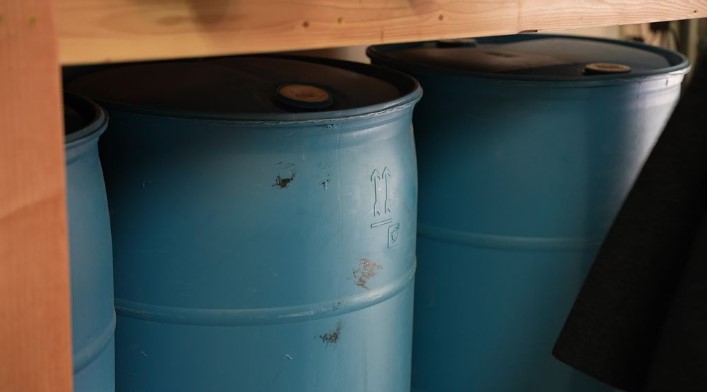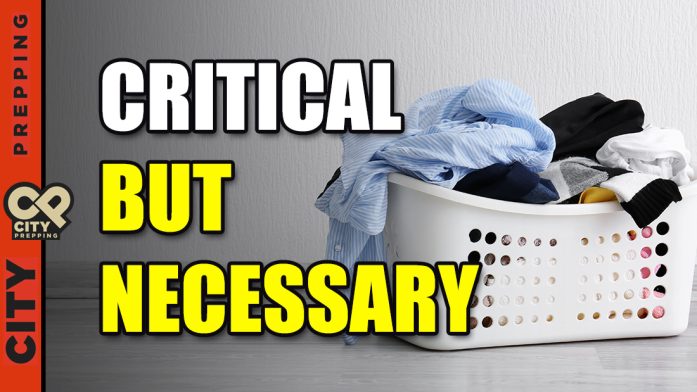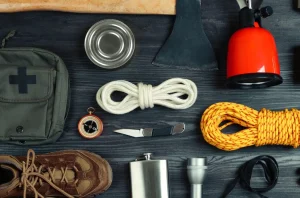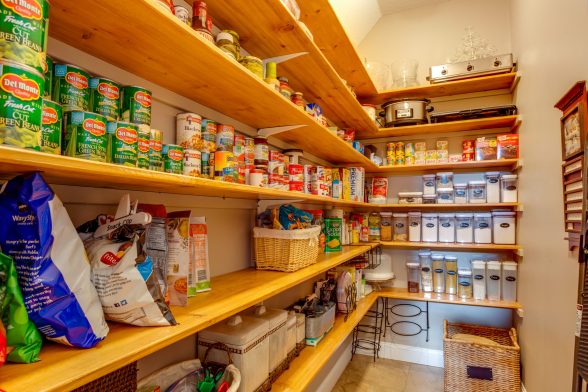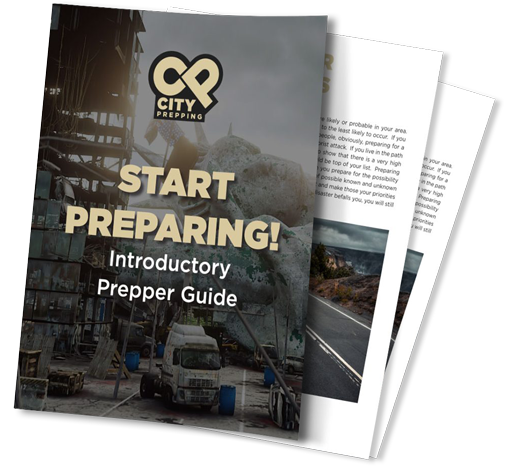- Confidence in Being Prepared
- Making Life Easier
- You Save Money
- Getting in Touch With the Old Ways
- Helping Others & Building Community
- You Can Be a SuperHero
- Doing More With Less
- Time
- Money
- Judgment of Others
 A prepper is a term that encompasses everyone from your great grandparents who made their own pickles, hunted, and fixed their own equipment to the person with the well-stocked pantry and an emergency kit to the off-the-grid hermit and recluse. The term encompasses the practical and prudent individual to the geographically or socially isolated. With that wide range of a definition, it’s not uncommon to get a sideways glance or two when someone whispers to someone else that you’re “one of those preppers.”
Those people who would whisper are missing two main things that the world has proven repeatedly. First, we are heavily dependent upon fragile systems that deliver just-in-time food, medicine, energy, and water that we absolutely must have to survive. Second, those systems can fail and do fail quite often. While the failure of a tiny component of the system, like a meat processing plant shutting down temporarily, may not push the whole system over a cliff, the loss of one system in conjunction with another, like a snowstorm, civil unrest, or a hurricane, can result in a cascading failure across multiple systems. The power going out in an ice storm can force a boil order or stop the flow of water to you altogether. Every modern convenience seems to take us one step further from our self-sufficiency. We trade access and convenience for independence and become dependent upon systems that repeatedly fail.
So for our purposes, the term prepper is anyone who is here to increase their own self-reliance and to decrease their dependence on government and institutional systems. It’s the casual dehydrator and gardener. It’s the well-armed bunker builder. It’s the off-the-grid homesteader. Because those all share the one core common factor– they desire to be more self-sufficient and less dependent on others for their survival. So, not that you really should need them, but here are the seven reasons you should be prepping and becoming more self-sufficient.
Confidence in Being Prepared
A prepper is a term that encompasses everyone from your great grandparents who made their own pickles, hunted, and fixed their own equipment to the person with the well-stocked pantry and an emergency kit to the off-the-grid hermit and recluse. The term encompasses the practical and prudent individual to the geographically or socially isolated. With that wide range of a definition, it’s not uncommon to get a sideways glance or two when someone whispers to someone else that you’re “one of those preppers.”
Those people who would whisper are missing two main things that the world has proven repeatedly. First, we are heavily dependent upon fragile systems that deliver just-in-time food, medicine, energy, and water that we absolutely must have to survive. Second, those systems can fail and do fail quite often. While the failure of a tiny component of the system, like a meat processing plant shutting down temporarily, may not push the whole system over a cliff, the loss of one system in conjunction with another, like a snowstorm, civil unrest, or a hurricane, can result in a cascading failure across multiple systems. The power going out in an ice storm can force a boil order or stop the flow of water to you altogether. Every modern convenience seems to take us one step further from our self-sufficiency. We trade access and convenience for independence and become dependent upon systems that repeatedly fail.
So for our purposes, the term prepper is anyone who is here to increase their own self-reliance and to decrease their dependence on government and institutional systems. It’s the casual dehydrator and gardener. It’s the well-armed bunker builder. It’s the off-the-grid homesteader. Because those all share the one core common factor– they desire to be more self-sufficient and less dependent on others for their survival. So, not that you really should need them, but here are the seven reasons you should be prepping and becoming more self-sufficient.
Confidence in Being Prepared
 When you have prepared for the worst and are stocked and ready, sometimes the worst never comes for you. It may come for others who have failed to prepare, but you may weather the storm with confidence that you have what you need. If the power goes out for a day, no problem. If it goes out for several weeks, there could be chaos in the streets, and stores will be looted. You will confidently be free from much of that chaos and desperation because you will have what you need to care for yourself and those in your family or group.
With this confidence also comes better decision-making. Suppose the conditions continue to deteriorate after a calamity of any kind. In that case, it does so because people become more and more desperate to secure a morsel of food or a drink of water. With those needs already prepped and met for you, you can better take a higher view of the situation you are facing. Your decisions are based on sound judgment and not made out of desperation. Your self-sufficiency directly translates into the confidence that you are prepared.
Making Life Easier
When you have prepared for the worst and are stocked and ready, sometimes the worst never comes for you. It may come for others who have failed to prepare, but you may weather the storm with confidence that you have what you need. If the power goes out for a day, no problem. If it goes out for several weeks, there could be chaos in the streets, and stores will be looted. You will confidently be free from much of that chaos and desperation because you will have what you need to care for yourself and those in your family or group.
With this confidence also comes better decision-making. Suppose the conditions continue to deteriorate after a calamity of any kind. In that case, it does so because people become more and more desperate to secure a morsel of food or a drink of water. With those needs already prepped and met for you, you can better take a higher view of the situation you are facing. Your decisions are based on sound judgment and not made out of desperation. Your self-sufficiency directly translates into the confidence that you are prepared.
Making Life Easier
 When you prep to be more self-sufficient, you make your life easier in so many ways. The sudden shock of unemployment is stressful, sure, but it is less so if you know you have the food you need stored away and understand how to prepare it. When the power goes out during the middle of the winter, you’re not left freezing and unable to cook and take care of your family. You have a plan in place to make the sudden loss of power more manageable for you to endure.
Stress, itself, cannot kill you; however, its effects on the body can lead to premature death over time. When many are worried about whether they’ll be able to make a meal because there’s currently a run on items at your local grocery store, your life is easier because you already have a well-stocked pantry, already know how to forage, fish, or hunt, already had dehydrated or freeze-dried food from your garden last season, already know how to make a meal with just a few simple ingredients. Prepping to be more self-sufficient leads to an easier life with less stress and less struggle.
You Save Money
When you prep to be more self-sufficient, you make your life easier in so many ways. The sudden shock of unemployment is stressful, sure, but it is less so if you know you have the food you need stored away and understand how to prepare it. When the power goes out during the middle of the winter, you’re not left freezing and unable to cook and take care of your family. You have a plan in place to make the sudden loss of power more manageable for you to endure.
Stress, itself, cannot kill you; however, its effects on the body can lead to premature death over time. When many are worried about whether they’ll be able to make a meal because there’s currently a run on items at your local grocery store, your life is easier because you already have a well-stocked pantry, already know how to forage, fish, or hunt, already had dehydrated or freeze-dried food from your garden last season, already know how to make a meal with just a few simple ingredients. Prepping to be more self-sufficient leads to an easier life with less stress and less struggle.
You Save Money
 Around the first part of the year, many of us commit to eating healthier. How many salads do we buy, and how many of those go bad in our refrigerators and get tossed out? When the bananas go a little brown, do you make banana chips or banana bread out of them, or do you toss them out? When something simple stops working or breaks, do you have the attitude that you will take the time to research and learn how to fix it yourself, or do you pay a mechanic 100-dollars an hour plus double the part’s cost? When you prep to become more self-sufficient, you increase your skills, confidence, and know-how. These return to you in immediate savings. When you eat your preps, as I advise, you save the 300 percent markup on your food that a restaurant charges. Would you rather pay the local grower a dollar and have supplies for months or the restaurant three dollars to have a less healthy meal that’s only good while it is warm? When you prep to become more self-sufficient, you will find that you have more money in your pocket and more buying power. The savings are almost immediately noticeable.
Getting in Touch With The Old Ways
Around the first part of the year, many of us commit to eating healthier. How many salads do we buy, and how many of those go bad in our refrigerators and get tossed out? When the bananas go a little brown, do you make banana chips or banana bread out of them, or do you toss them out? When something simple stops working or breaks, do you have the attitude that you will take the time to research and learn how to fix it yourself, or do you pay a mechanic 100-dollars an hour plus double the part’s cost? When you prep to become more self-sufficient, you increase your skills, confidence, and know-how. These return to you in immediate savings. When you eat your preps, as I advise, you save the 300 percent markup on your food that a restaurant charges. Would you rather pay the local grower a dollar and have supplies for months or the restaurant three dollars to have a less healthy meal that’s only good while it is warm? When you prep to become more self-sufficient, you will find that you have more money in your pocket and more buying power. The savings are almost immediately noticeable.
Getting in Touch With The Old Ways
 A person born before 1950 is more likely to know how to change a tire, dress a fish, grow a tomato, navigate with a map and compass, tie a survival knot, mend clothing, cook, and build a structure that is sturdy enough to be still standing today. In the last 70 years, however, many countries have grown their economies and surrounded themselves with commercial luxuries to the extent that they have forgotten older, traditional ways of doing things. The practical skills of life like soap making, home brewing, canning, pickling, fishing, knitting, crocheting, sewing, candy making, candle making, woodworking, raising chickens, cheese making, gardening, even cooking have become twee hobbies for many. They are no longer necessities that we must do throughout the year to survive. We all know at least one person; maybe we are that one person who buys their soap, beer, pickles, eggs, and clothes from a store and would be lost entirely without this ability. When we take the time to learn a skill, even just one skill, we increase our value to others, we improve our quality of life, and we create an abundance we couldn’t possibly use entirely by ourselves. We don’t have to know everything, but it helps to know something.
Helping Others & Building Community
A person born before 1950 is more likely to know how to change a tire, dress a fish, grow a tomato, navigate with a map and compass, tie a survival knot, mend clothing, cook, and build a structure that is sturdy enough to be still standing today. In the last 70 years, however, many countries have grown their economies and surrounded themselves with commercial luxuries to the extent that they have forgotten older, traditional ways of doing things. The practical skills of life like soap making, home brewing, canning, pickling, fishing, knitting, crocheting, sewing, candy making, candle making, woodworking, raising chickens, cheese making, gardening, even cooking have become twee hobbies for many. They are no longer necessities that we must do throughout the year to survive. We all know at least one person; maybe we are that one person who buys their soap, beer, pickles, eggs, and clothes from a store and would be lost entirely without this ability. When we take the time to learn a skill, even just one skill, we increase our value to others, we improve our quality of life, and we create an abundance we couldn’t possibly use entirely by ourselves. We don’t have to know everything, but it helps to know something.
Helping Others & Building Community
 When we find ourselves with an abundance, we seek others to share in it. We may seek to share and exchange knowledge or the cornucopia of what we produce. If you grow six tomato plants, the chances are canning sauces and drying them will be even more than you and a small family can feasibly utilize. I was nice when I earlier mentioned that you probably know one person who is utterly dependent upon getting everything they use and consume from stores and restaurants. If statistics and studies are to be believed, slightly over half of all Americans don’t have more than a 3-day food supply. Have you ever had to pause to consider if you had something at home to eat or you needed to stop by a grocery store on your way home to be able to make dinner? Even if you are prepared with a year or more supply of personal food, will you then turn friends, neighbors, and family away from your door at gunpoint to hold on to your supplies? When you ponder that question in your prepping journey, you begin to see the value of helping others learn to prep. Some neighborhoods have started community gardens and food exchanges. Helping others is the beginning of creating a mutual assistance group. When you aren’t going it entirely alone, your chances of survival increase dramatically. If you are already having a discussion with your group about the emerging threats, if you are already helping and assisting one another, you are more likely to organize and prepare better. The effects of the disaster will be lessened, and your recovery will be more robust.
You Can Be A Hero
When we find ourselves with an abundance, we seek others to share in it. We may seek to share and exchange knowledge or the cornucopia of what we produce. If you grow six tomato plants, the chances are canning sauces and drying them will be even more than you and a small family can feasibly utilize. I was nice when I earlier mentioned that you probably know one person who is utterly dependent upon getting everything they use and consume from stores and restaurants. If statistics and studies are to be believed, slightly over half of all Americans don’t have more than a 3-day food supply. Have you ever had to pause to consider if you had something at home to eat or you needed to stop by a grocery store on your way home to be able to make dinner? Even if you are prepared with a year or more supply of personal food, will you then turn friends, neighbors, and family away from your door at gunpoint to hold on to your supplies? When you ponder that question in your prepping journey, you begin to see the value of helping others learn to prep. Some neighborhoods have started community gardens and food exchanges. Helping others is the beginning of creating a mutual assistance group. When you aren’t going it entirely alone, your chances of survival increase dramatically. If you are already having a discussion with your group about the emerging threats, if you are already helping and assisting one another, you are more likely to organize and prepare better. The effects of the disaster will be lessened, and your recovery will be more robust.
You Can Be A Hero
 As I mentioned earlier, even if you prepare, the majority of those around you will not. The adage you can lead a horse to water, but you cannot make him drink is true. You can witness the same disaster after disaster that your neighbor does. You can see the same early signs of economic collapse or infrastructure hiccups, but it doesn’t mean that you and your neighbor will come to the same conclusions about what you see. It doesn’t mean that you will get that neighbor, who you like, to get prepared themselves. The fact of the matter is when a disaster gets really bad, and the people get really desperate, you will likely find yourself wanting to be a hero to someone. Are you going to let your friend’s mom on a dialysis machine die when the power goes out when your generator is working quite well? I read many of the comments on this channel, and a frequent one is “My husband thought I was overreacting, but boy was he glad when XYZ happened…” Prepping puts you in the position of being capable of being a hero to others instead of part of the shuffled and abused herd struggling in the aftermath of the XYZ. You aren’t at the mercy of government and non-government organization responses to disasters. While politicians debate relief efforts, you can choose to be helping others.
Doing More With Less
As I mentioned earlier, even if you prepare, the majority of those around you will not. The adage you can lead a horse to water, but you cannot make him drink is true. You can witness the same disaster after disaster that your neighbor does. You can see the same early signs of economic collapse or infrastructure hiccups, but it doesn’t mean that you and your neighbor will come to the same conclusions about what you see. It doesn’t mean that you will get that neighbor, who you like, to get prepared themselves. The fact of the matter is when a disaster gets really bad, and the people get really desperate, you will likely find yourself wanting to be a hero to someone. Are you going to let your friend’s mom on a dialysis machine die when the power goes out when your generator is working quite well? I read many of the comments on this channel, and a frequent one is “My husband thought I was overreacting, but boy was he glad when XYZ happened…” Prepping puts you in the position of being capable of being a hero to others instead of part of the shuffled and abused herd struggling in the aftermath of the XYZ. You aren’t at the mercy of government and non-government organization responses to disasters. While politicians debate relief efforts, you can choose to be helping others.
Doing More With Less
 A by-product of prepping is being able to do more with less. When you truly understand the value and utilization of any resource, you can stretch it out and use it to its fullest. You find that what you thought you needed and what you really needed are far different. Far from merely getting by, you are using more of what you need and less of what you don’t need. So much of modern living also means excess. We tend to think of abundance, not in terms of its actual definition– more than enough. We are satisfied with thinking abundance is a huge portion of something and more than what we need at any one time. The result is often waste.
When you prep to become more self-sufficient, you will find that you are better at having just enough and not way too much. You learn what you need to truly feel comfortable with living through more challenging times, and you are less apt to seek solace in expensive things you don’t really need and won’t really use. You become a sort of minimalist who is neither deprived nor left wanting. We think we need to rely on others for services and expertise, but the prepper knows that every skill learned allows them to do more for themselves. In this way, they are doing more with less dependence on others.
What’s Holding You Back?
With all of those seven benefits I outlined, you would think that everyone would be prepping to become more self-sufficient. You would think that when disaster strikes, everyone would just leap into action and rebuild back better. Yet we know this isn’t true. Three things hold people back from becoming self-sufficient.
TIME
A by-product of prepping is being able to do more with less. When you truly understand the value and utilization of any resource, you can stretch it out and use it to its fullest. You find that what you thought you needed and what you really needed are far different. Far from merely getting by, you are using more of what you need and less of what you don’t need. So much of modern living also means excess. We tend to think of abundance, not in terms of its actual definition– more than enough. We are satisfied with thinking abundance is a huge portion of something and more than what we need at any one time. The result is often waste.
When you prep to become more self-sufficient, you will find that you are better at having just enough and not way too much. You learn what you need to truly feel comfortable with living through more challenging times, and you are less apt to seek solace in expensive things you don’t really need and won’t really use. You become a sort of minimalist who is neither deprived nor left wanting. We think we need to rely on others for services and expertise, but the prepper knows that every skill learned allows them to do more for themselves. In this way, they are doing more with less dependence on others.
What’s Holding You Back?
With all of those seven benefits I outlined, you would think that everyone would be prepping to become more self-sufficient. You would think that when disaster strikes, everyone would just leap into action and rebuild back better. Yet we know this isn’t true. Three things hold people back from becoming self-sufficient.
TIME
 You can’t hoard time. You can’t save it up. For good or bad, it is continually flowing in the same direction. You never can honestly know how much of it you will have, nor can you know when you will run out of it. With such a precious commodity, you would think we would spend less time pursuing mindless entertainment and investing more time in seeking knowledge and things that enrich our lives. I admit it. I sometimes just need a good movie that may be a little thought-provoking and entertaining rather than to think about what I need to do in my garden or how I can balance my schedule to work in exercise or even cook a meal. Time can hold you back from cultivating other interests. If you work full time and have a family, you know this to be true. To be a more self-sufficient prepper, you need to manage a few hours per week to pursue that goal. You need to prioritize your schedule and time to begin ticking away at your larger goals. If your big goal is to one day get off the grid and homestead a lovely five acres somewhere, realize you probably can’t do that this minute. Later, though, after you’ve learned some skills, reaped some savings, and invested in yourself, you may realize a path to attain that goal. Minimally, it will be closer to you after you have invested in yourself than it is right now, sitting on your couch, unable even to visualize it. Set realistic goals. Appoint a time to work toward those goals and keep your appointments with yourself. Before you know it, you will realize that though time is limited, you have more of it to spend in pursuit of your goals than you know you have right now.
MONEY
You can’t hoard time. You can’t save it up. For good or bad, it is continually flowing in the same direction. You never can honestly know how much of it you will have, nor can you know when you will run out of it. With such a precious commodity, you would think we would spend less time pursuing mindless entertainment and investing more time in seeking knowledge and things that enrich our lives. I admit it. I sometimes just need a good movie that may be a little thought-provoking and entertaining rather than to think about what I need to do in my garden or how I can balance my schedule to work in exercise or even cook a meal. Time can hold you back from cultivating other interests. If you work full time and have a family, you know this to be true. To be a more self-sufficient prepper, you need to manage a few hours per week to pursue that goal. You need to prioritize your schedule and time to begin ticking away at your larger goals. If your big goal is to one day get off the grid and homestead a lovely five acres somewhere, realize you probably can’t do that this minute. Later, though, after you’ve learned some skills, reaped some savings, and invested in yourself, you may realize a path to attain that goal. Minimally, it will be closer to you after you have invested in yourself than it is right now, sitting on your couch, unable even to visualize it. Set realistic goals. Appoint a time to work toward those goals and keep your appointments with yourself. Before you know it, you will realize that though time is limited, you have more of it to spend in pursuit of your goals than you know you have right now.
MONEY
 Do you want a year’s supply of food for an emergency? Just go buy a year’s supply kit for around three-thousand dollars. I know, that’s terrible advice because most of us don’t have that type of money just lying around. If that’s your prepping goal, though, and it probably ought to be, take a look at my video on what you need to build a year’s supply. That video is free. What it can teach you is how you can slowly build up to that year’s reserves. When you do it yourself, you can probably do it for a quarter of what will cost you if you get it pre-packaged and just a bit more time invested on your part.
You will already be saving money when you start prepping in earnest to be more self-sufficient. You can invest that money into your prepping supplies or yourself. If you ask the average person what their emergency plan is, they will likely say they have X amount set aside in the bank for an emergency. That’s not a plan. That’s a small reserve of fiat currency that could be either unspendable in a disaster or worthless. Of course, have some money set aside for an emergency, but direct your money to work for you. Focus on your goals. Invest in yourself. Even if you have very little initially, as you save in other areas of your life, you will find you have more. Your debt, if you have any, will be less. What you invest in yourself will pay you dividends throughout your life.
JUDGEMENT OF OTHERS
Do you want a year’s supply of food for an emergency? Just go buy a year’s supply kit for around three-thousand dollars. I know, that’s terrible advice because most of us don’t have that type of money just lying around. If that’s your prepping goal, though, and it probably ought to be, take a look at my video on what you need to build a year’s supply. That video is free. What it can teach you is how you can slowly build up to that year’s reserves. When you do it yourself, you can probably do it for a quarter of what will cost you if you get it pre-packaged and just a bit more time invested on your part.
You will already be saving money when you start prepping in earnest to be more self-sufficient. You can invest that money into your prepping supplies or yourself. If you ask the average person what their emergency plan is, they will likely say they have X amount set aside in the bank for an emergency. That’s not a plan. That’s a small reserve of fiat currency that could be either unspendable in a disaster or worthless. Of course, have some money set aside for an emergency, but direct your money to work for you. Focus on your goals. Invest in yourself. Even if you have very little initially, as you save in other areas of your life, you will find you have more. Your debt, if you have any, will be less. What you invest in yourself will pay you dividends throughout your life.
JUDGEMENT OF OTHERS
 If time and money don’t hold us back, the judgment of others will stop us dead in our tracks. People don’t want to be labeled as an outsider or prepper. People don’t want to be perceived as chasing windmills and fearing the boogeyman lurking around every corner. People don’t want to be the topic of gossip, innuendo, and conversation. So, don’t be. If you don’t like the term prepper, don’t use it. Try cook, camper, thrifty, resourceful, creative, fixer, helper, hiker, community organizer, club president, or any other label that gets you closer to your prepper goals. And take it a step further than that, become the organizer and gatherer. Throw a potluck or a cooking party. Invite some friends to go hiking, camping, hunting, or fishing. Create a sewing or knitting circle. Become an activist for a safer or cleaner community. Become a craftivist and gather a group of like-minded people together. Even if you only get your family and friends engaged in a healthy walk a few times per week, you are slowly working at your prepper health goals. Without knowing it, they are too. Whatever you do, realize three things. First, the judgment of others is not important. Two, your prepping goals are not all attained in one big bite. They are spread out over many activities and many goals. Third, people are less apt to judge you if they are engaged in the same activities.
Conclusion
There, you have the seven reasons you should prep to become more self-sufficient and the three reasons you are holding yourself back. You may not have thought of some of these before, and I hope I left you with something to ponder. The number one reason that I barely touch upon is that you are increasing your odds of survival when you work toward freeing yourself from over-dependence on systems that absolutely, at some point, will fail. Take a few moments to peruse some of the videos on this channel and others. Set some small, realistic goals and start working towards them. You are never too late until you find yourself absolutely out of time.
What do you think? Did I cover everything? What’s your number one reason to prep to be self-sufficient? What do you think is holding you or others back?
As always, please stay safe out there.
If time and money don’t hold us back, the judgment of others will stop us dead in our tracks. People don’t want to be labeled as an outsider or prepper. People don’t want to be perceived as chasing windmills and fearing the boogeyman lurking around every corner. People don’t want to be the topic of gossip, innuendo, and conversation. So, don’t be. If you don’t like the term prepper, don’t use it. Try cook, camper, thrifty, resourceful, creative, fixer, helper, hiker, community organizer, club president, or any other label that gets you closer to your prepper goals. And take it a step further than that, become the organizer and gatherer. Throw a potluck or a cooking party. Invite some friends to go hiking, camping, hunting, or fishing. Create a sewing or knitting circle. Become an activist for a safer or cleaner community. Become a craftivist and gather a group of like-minded people together. Even if you only get your family and friends engaged in a healthy walk a few times per week, you are slowly working at your prepper health goals. Without knowing it, they are too. Whatever you do, realize three things. First, the judgment of others is not important. Two, your prepping goals are not all attained in one big bite. They are spread out over many activities and many goals. Third, people are less apt to judge you if they are engaged in the same activities.
Conclusion
There, you have the seven reasons you should prep to become more self-sufficient and the three reasons you are holding yourself back. You may not have thought of some of these before, and I hope I left you with something to ponder. The number one reason that I barely touch upon is that you are increasing your odds of survival when you work toward freeing yourself from over-dependence on systems that absolutely, at some point, will fail. Take a few moments to peruse some of the videos on this channel and others. Set some small, realistic goals and start working towards them. You are never too late until you find yourself absolutely out of time.
What do you think? Did I cover everything? What’s your number one reason to prep to be self-sufficient? What do you think is holding you or others back?
As always, please stay safe out there. 